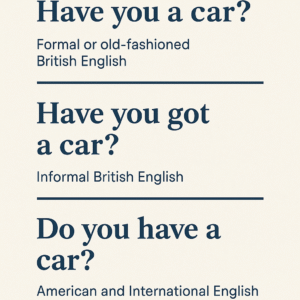English learners often wonder which version is correct: “Have you a car?”, “Have you got a car?”, or “Do you have a car?” All three forms ask the same question, but they differ based on usage, style, and region. Let’s break down each one to understand when and how to use it.
1. Have You a Car?
This form may sound unusual to many modern English speakers, especially in casual conversation. However, it is grammatically correct and more common in British English, particularly in formal or old-fashioned contexts.
-
Example: Have you a moment to talk?
-
Usage: Formal writing, literature, older British usage.
Although technically correct, this form is rarely used today. In modern English, people often prefer the next two forms.
2. Have You Got a Car?
This version is also British English and is more common in both spoken and informal written English in the UK. It emphasizes possession and is widely accepted.
-
Example: Have you got any siblings?
-
Usage: Informal British English, everyday conversations.
It works just like a question using the present perfect tense (have/has + past participle), though in this case, got functions more like an auxiliary verb.
3. Do You Have a Car?
This is the standard form in American English. It is simple, modern, and commonly used in all settings—from formal writing to casual conversations.
-
Example: Do you have a pen I could borrow?
-
Usage: All varieties of English, especially American.
“Professionals and academics around the world also widely accept this form.”
Final Thoughts
Use “Do you have” in American English or international contexts.
>Use “Have you got” in casual, everyday British English.
>Use “Have you” only in formal writing or older British English usage.

“Along with”:
https://grammarpuzzlesolved.englishlitnotes.com/the-book-along-with-the-notebooks/
The Summoner in The Canterbury Tales:
https://englishlitnotes.com/2025/06/07/summoner-in-the-canterbury-tales/
Louis Pasteur by Margaret Avery:
https://englishwithnaeemullahbutt.com/2025/06/02/louis-pasteur-margaret-avery/
Anne Bradstreet-A Voice of Early American Poetry: